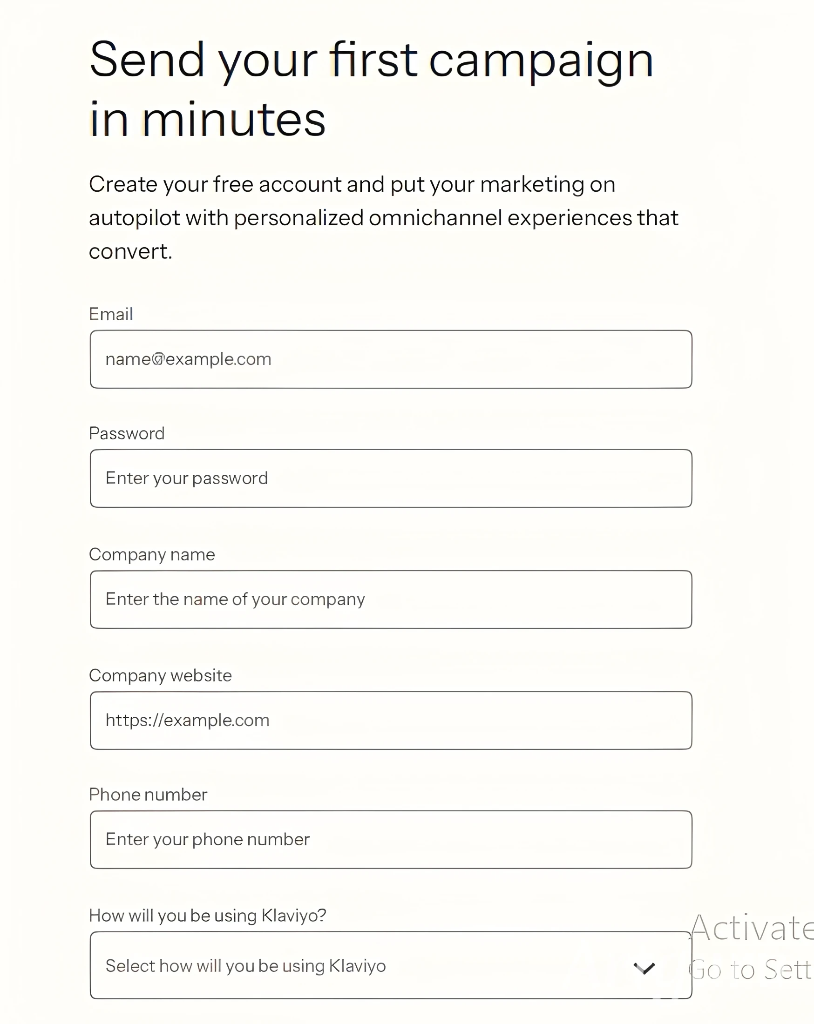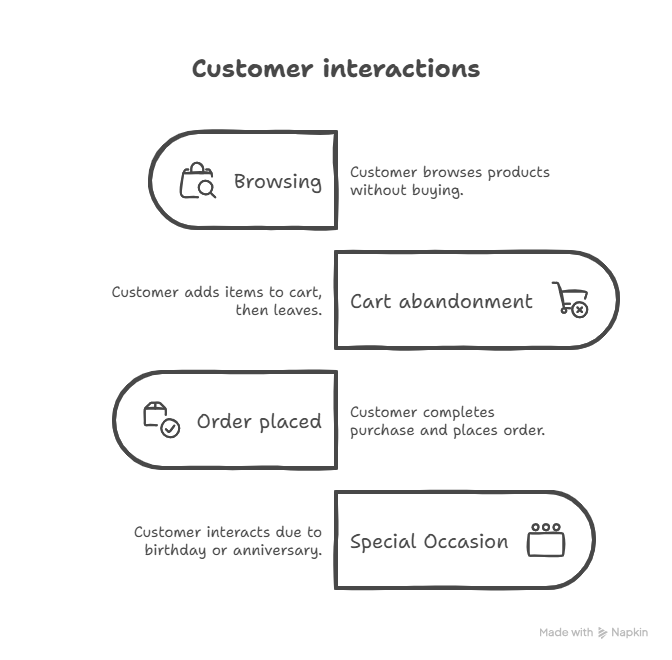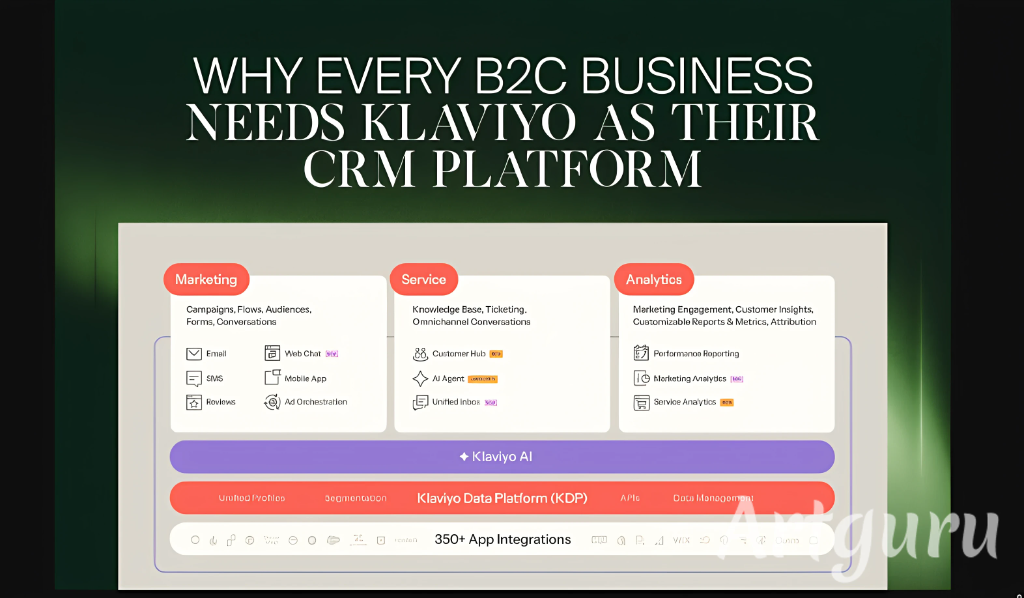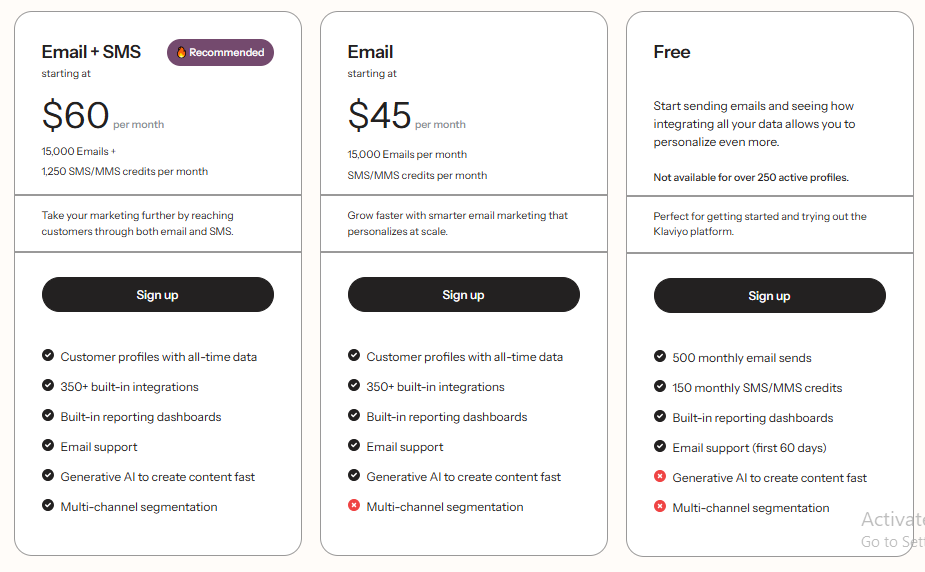In today’s competitive ecommerce landscape, customer relationships are everything. Businesses must go beyond one-time transactions and build personalized, data-driven connections with consumers. That’s where Klaviyo as a B2C CRM comes into play. This article explores how to effectively use Klaviyo, create sign-up forms, understand pricing, and compare it with competitors like Mailchimp — all while optimizing for ecommerce growth.
How to Use Klaviyo as a B2C CRM
Klaviyo is not just an email marketing tool — it’s a full-fledged B2C CRM (Customer Relationship Management) designed to help ecommerce brands collect, store, and utilize customer data for personalized communication.
Here’s how you can use Klaviyo as your CRM:
-
Data Collection: Klaviyo captures user data from websites, forms, checkout pages, and integrations like Shopify.
-
Segmentation: Segment your audience based on behavior (e.g., cart abandonment, purchase frequency, email engagement).
-
Personalized Messaging: Send highly targeted emails or SMS based on customer behavior and preferences.
-
Lifecycle Campaigns: Automate onboarding, win-back, and post-purchase campaigns to maximize customer lifetime value.
Its power lies in its ability to turn customer data into actionable insights and engagement strategies.
Sign up for Klaviyo free
1. Email
2. Enter your password
3. Enter the name of your company
4. Company website
5. Enter your phone number
6. How will you be using Klaviyo?
7. Please Check This option Sign up for Klaviyo’s
8. Please Check This option would like a live consultation/walkthrough.
9. Click I’m not a robot
10. Final Click Create account
Note: If someone signs up following this link, I will get an Bonus.

Best B2C CRM for Ecommerce: Is Klaviyo the Winner?
There are several CRM options for ecommerce, but Klaviyo is often considered the best B2C CRM for ecommerce. Why?
-
Native Ecommerce Integration: Directly integrates with platforms like Shopify, WooCommerce, Magento, and BigCommerce.
-
Behavioral Tracking: Understand customer behavior in real time — what they view, click, and buy.
-
Automation & Segmentation: Pre-built flows and powerful customer segmentation options.
-
Predictive Analytics: Estimate future buying behaviors and churn risks.
Other CRM tools like HubSpot and ActiveCampaign are great but often require more customization and cost for ecommerce features. Klaviyo is built specifically for online stores.
Note: If someone signs up following this link, I will get an Bonus.
5 Benefits of Using a B2C CRM
- Enhanced Personalization: Deliver tailored messages based on behavior, demographics, and purchase history.
- Higher Customer Retention: Automated flows and targeted campaigns help keep your customers engaged.
- Improved Marketing Efficiency: Save time and reduce manual work with automated workflows.
- Better Decision-Making: Real-time analytics and customer insights guide your marketing strategy.
- Increased Revenue: More relevant messages result in higher conversion rates and better ROI.
5 Key Features of a B2C CRM
- Customer Segmentation: Group customers by behavior, preferences, and demographics.
- Marketing Automation: Build flows for abandoned carts, welcome series, product recommendations, and more.
- Multichannel Communication: Connect with customers via email, SMS, push notifications, and social media.
- Real-Time Analytics: Track campaign performance and optimize on the go.
- Integration Capabilities: Seamlessly connect with your eCommerce platforms like Shopify, BigCommerce, and WooCommerce.
Is Klaviyo Good for B2C Email Marketing?
Absolutely. Klaviyo is one of the best platforms for B2C email marketing due to its:
-
Advanced personalizations using customer data.
-
Drag-and-drop email builder with ecommerce-focused templates.
-
A/B testing tools to optimize subject lines, content, and CTAs.
-
Automated flows for abandoned carts, welcome series, post-purchase follow-ups, and more.
B2C brands benefit immensely from Klaviyo’s ability to tailor campaigns to individual behaviors and preferences, which boosts open rates, clicks, and conversions.
Klaviyo CRM vs Mailchimp CRM
When comparing Klaviyo CRM vs Mailchimp CRM, it’s important to note key differences:
| Feature | Klaviyo | Mailchimp |
|---|---|---|
| Ecommerce Integration | Strong Shopify/Shopify Plus | Basic Ecommerce tools |
| Segmentation | Advanced behavior-based | List-based, less flexible |
| Automation | Powerful flows and triggers | Limited compared to Klaviyo |
| Analytics | Predictive and in-depth | Basic reports |
| Pricing | More value for ecommerce brands | Cheaper but less ecommerce-focused |
If you’re running a product-based online business, Klaviyo clearly offers more robust CRM and marketing automation capabilities.
Note: If someone signs up following this link, I will get an Bonus.

Klaviyo Marketing Automation for B2C Brands
One of Klaviyo’s strongest features is its marketing automation for B2C. You can create workflows (called “Flows”) triggered by actions like:
-
Browsing without purchasing
-
Cart abandonment
-
Order placed
-
Birthday or anniversary
Each flow can be customized with conditional logic, delays, and channel choices (email or SMS). This level of automation helps brands stay relevant, timely, and personalized — which is crucial for building long-term customer relationships.
B2C CRM Case Studies Using Klaviyo
Real-world case studies using Klaviyo show its effectiveness across industries:
-
Skin Care Brand: Increased revenue by 25% using personalized welcome series and post-purchase emails.
-
Fashion Retailer: Reduced cart abandonment rate by 15% with targeted recovery emails.
-
Subscription Box Company: Used predictive analytics to tailor product recommendations, boosting repeat purchases by 30%.
These examples demonstrate how brands leverage Klaviyo’s CRM features to deliver the right message to the right person at the right time.
Klaviyo CRM Pricing for B2C Brands
Klaviyo’s pricing is based on the number of contacts in your account, and includes both email and SMS marketing capabilities.
Here’s a quick breakdown:
-
Free Plan: Up to 500 contacts and 150 email sends per day.
-
Paid Email Plan: Starts at $20/month for up to 500 contacts and scales as your list grows.
-
Email + SMS Plan: Pricing varies based on volume; SMS credits are charged separately.
While it may seem more expensive than tools like Mailchimp, the value lies in Klaviyo’s advanced features designed specifically for ecommerce growth and retention.
Klaviyo Shopify CRM Integration
Klaviyo’s integration with Shopify is seamless and powerful, making it a top choice for Shopify store owners. Benefits include:
-
Real-time syncing of customer data, orders, and products.
-
Event tracking for viewed products, added to cart, and purchases.
-
Dynamic product blocks in emails based on Shopify inventory and preferences.
-
Advanced segmentation using Shopify tags, order history, and behavior.
You can set it up in minutes from the Shopify App Store or from your Klaviyo dashboard, and immediately start building powerful marketing automations tailored to Shopify data.
Final Thoughts
Using Klaviyo as a B2C CRM allows ecommerce businesses to elevate their marketing strategy with automation, personalization, and powerful data insights. From sign-up forms to Shopify integration, Klaviyo simplifies complex CRM tasks into user-friendly features.
Whether you’re comparing it to Mailchimp or looking for the best B2C CRM for ecommerce, Klaviyo consistently proves itself to be a top performer. Its marketing automation tools, robust analytics, and seamless integrations make it the go-to platform for modern ecommerce brands looking to grow smarter.


